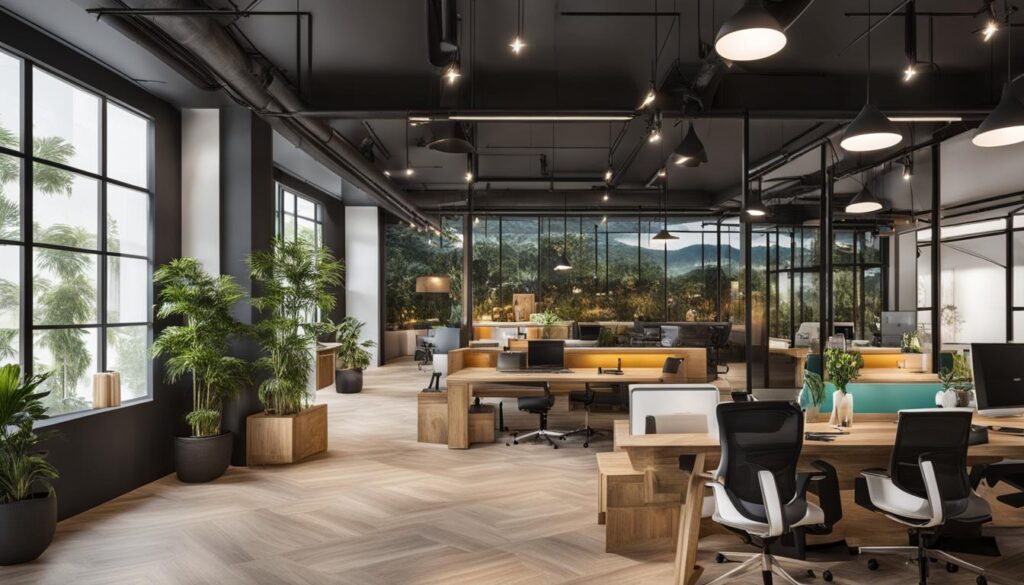Explore the ultimate remote working in Thailand guide and unlock the secrets to a seamless digital nomad life in the Land of Smiles.
While beaches and temples are common vistas associated with Thailand, a surprising 23% increase in the country’s expatriate remote workforce signals a notable paradigm shift. The allure of its vibrant urban centers, serene beach towns, and rich cultural tapestry is now augmented by the growing trend of a remote work lifestyle in Thailand. It is no wonder that Thailand stands as a beacon for the modern digital nomad looking to embrace the dynamic work from home phenomenon.
With remote work becoming more than a passing trend—especially post-pandemic—this South-East Asian haven is fast becoming the chosen home for many seeking to balance productivity with adventure. Accessible, inviting, and brimming with opportunities for both work and relaxation, Thailand presents an enviable crossroads of high-tech efficiency and laid-back living.
Whether it’s Internet-savvy urbanites, culturally-enriching locales, or attraction-laden beachfronts, the medley of experiences on offer ensures that the expat remote work scene in Thailand is as colorful as it is conducive to personal and professional growth. If you’re contemplating a blend of exploration and employment, our remote working in Thailand guide provides you with all the insights you need to make the transition successfully.
Key Takeaways
- Thailand’s unexpected rise as a remote work hub post-pandemic.
- The perfect mesh of cultures and conveniences that attract digital nomads.
- Diverse landscapes that offer a seamless blend of work and adventure.
- Essential guide for expatriates to navigate remote working in Thailand.
- Thailand’s potential as a long-term residence for global remote workers.
Understanding Thailand’s Remote Work Regulations
As Thailand becomes a hotbed for the digital nomad lifestyle, understanding the remote work legal requirements in Thailand is quintessential for those wishing to merge work with the unparalleled beauty of Thai locales. While the allure of tropical beaches and bustling cityscapes may draw many remote workers to this Southeast Asian paradise, it is the understanding of remote work laws Thailand that ensures a stress-free stay.
Criteria for Defining Work in Thailand
In Thailand, ‘work’ is broadly described as exerting energy or using knowledge or effort to produce something. This wide definition necessitates that anyone engaged in such activities, including those seeking Thailand remote job opportunities, remain aware of evolving local legal frameworks. Although the digital era has presented new types of employment, the Thai government regards these under the same scrutiny as traditional roles.
The Grey Area for Digital Nomads and Work Permits
For the ever-growing digital nomad community in Thailand, the legal terrain is somewhat uncharted. The current legislative parameters imply a grey area where a work permit may be required even for remote roles performed for entities outside of Thailand. As such, remote workers contemplating life in this picturesque country should proactively keep abreast of changes to ensure they operate within legal boundaries.
Legality of Different Remote Work Scenarios
Each remote work scenario bears different legal considerations. From freelancers working on international projects to employees of multinational corporations using Thailand as their base, the demands for legal compliance differ. Below is a table overview of various remote work scenarios and their relevant legal obligations:
| Remote Work Scenario | Work Permit Required | Possible Legal Implications |
|---|---|---|
| Overseas Freelancer | Yes, in most cases | Competing with local labor may lead to legal scrutiny |
| Full-time Employee of a Non-Thai Company | Yes, if staying long-term | Impact on local security or interests can escalate legal risk |
| Online Business Owner | Yes | Mandatory registration and adherence to online business laws |
| Remote Workers on Tourist Visas | No, if stay is short-term | Overstay or unauthorized work can have severe penalties |
Navigating through the intricate tapestry of remote work laws Thailand might seem daunting, but the rewards of the digital nomad lifestyle in Thailand can be abundant, provided workers remain compliant and informed. The essence of successful remote working in this land of smiles lies within the balanced triad of legal awareness, cultural immersion, and personal responsibility.
Exploring Thailand’s Digital Nomad Visas
The notion of becoming a digital nomad in Thailand is an alluring one, synonymous with flexibility and the allure of tropical paradise. As a testament to Thailand’s progressive stance on remote work, the introduction of the Thailand Digital Nomad Visa paves the way for tech-savvy professionals to relish the benefits of a long-term stay peppered with economic contribution opportunities. Crucial to understanding the remote work options in Thailand is an awareness of the visas available, ensuring that your transition to this Southeast Asian hub is as smooth as possible.
The table below outlines key features of the various remote work visas Thailand offers:
| Type of Visa | Eligibility | Residency Duration | Primary Advantage |
|---|---|---|---|
| Smart Visa | Professionals, investors, and entrepreneurs with substantial economic impact | 1-4 years, renewable | Facilitates the growth of innovative businesses and investment in Thailand |
| Thai Digital Nomad Visa | Remote workers with a stable income | Up to 10 years | Designed for long-term residency, promoting skilled workers’ contribution to the Thai economy |
| Tourist Visa (used by digital nomads) | General tourists seeking short-term stay | 30-60 days, extendable | Simple entry point for transitioning to a more robust visa |
While the Smart Visa is ideal for those at the forefront of technology, business, or investment ventures, the broader array of digital nomads can revel in the extended stay granted by the dedicated Thai Digital Nomad Visa. This visa class is a clear indicator of Thailand’s commitment to becoming a global digital nomad hotspot. The option for a short-term tourist visa continues to exist, but for serious professionals, a more stable visa arrangement is highly recommended.

Whether aspiring to cultivate a career from a bustling cityscape or a serene beachfront office, Thailand’s visa options aim to facilitate a productive and blissful remote working experience. The land of smiles awaits with open arms, ready to endorse the growth of the remote work visas Thailand market in pursuit of economic diversity and innovation.
Best Cities in Thailand for Remote Workers
Thailand’s reputation as a hotspot for remote workers is well-deserved, with its array of cities offering vibrant diversity that caters to varying preferences and lifestyles. Whether you’re in the market for urban excitement or coastal calmness, Thailand delivers some of the best cities for remote work, each with unique attractions and remote job opportunities in Thailand. Discover below how each city aligns with the digital nomad lifestyle in Thailand.
Cosmopolitan Comforts: Working in Bangkok
Bangkok stands as a bustling metropolis, blending the allure of modernity with traditional charm. Its status as the business epicenter of Thailand means remote workers have access to high-speed internet, luxury co-working spaces, and endless networking possibilities amidst a culturally rich setting.
Laid-Back Lifestyle: Chiang Mai for Digital Nomads
Chiang Mai offers a more tranquil alternative, with its laid-back atmosphere, rich cultural tapestry, and affordability. It’s a favorite for digital nomads who seek to combine work with exploration, offering a balance of peace and productivity amidst the city’s temples and street markets.
Island Serenity: Beach Towns for Ultimate Focus
The beach towns of Thailand, like Koh Samui and Phuket, are not just vacation spots but also peaceful work havens. Here, remote workers can enjoy serene beaches and tropical climates, providing an idyllic environment that’s conducive to deep focus and elevated creativity amidst nature’s beauty.
Cost of Living for Remote Workers in Thailand

Thailand’s charm is its blend of affordability and quality of life, particularly enticing for the growing community of remote workers. Compared to many Western countries, the cost of living for remote workers in Thailand is distinctly more manageable, allowing them to enjoy a higher standard of living while indulging in the country’s diverse cultural experiences. Yet, it’s not a one-size-fits-all scenario; costs can fluctuate greatly depending on location, lifestyle, and preferences.
For many, the primary draw is the diversity in accomodation options, welcoming both frugal single entrepreneurs and those with families looking for more luxurious living spaces. Beyond housing, everyday expenses—from mouthwatering street food to convenient transportation options—remain accesible, ensuring that life in Thailand doesn’t come with a hefty price tag.
Thailand offers an adventurous lifestyle at a cost that’s hard to beat, especially when considering the quality of life and the multitude of experiences available at your doorstep. It’s no wonder that remote workers are drawn to this vibrant country.
Let’s delve into a comparison of living expenses that typically concern remote workers:
| Expense Category | Average Cost in Bangkok | Average Cost in Chiang Mai |
|---|---|---|
| Monthly Rent (1-bedroom apartment) | $500 – $1000 | $250 – $500 |
| Utilities (Electricity, Heating, Cooling, Water, Garbage) | $50 – $150 | $30 – $100 |
| Groceries | $200 – $300 | $150 – $250 |
| Dining Out | $150 – $400 | $100 – $300 |
| Public Transportation | $15 – $50 | $20 – $60 |
| Leisure Activities | $50 – $150 | $30 – $100 |
| Internet and Phone | $20 – $30 | $15 – $25 |
Budgeting for the cost of living for remote workers in Thailand is not merely a financial calculation, but a gateway to a desirable lifestyle peppering work with tropical adventures. In conclusion, whether you’re drawn to Bangkok’s hustle or Chiang Mai’s calming retreats, Thailand’s cost-effective living ensures you don’t compromise on quality—a pivotal factor when selecting a destination for remote work.
Coworking Spaces and Internet Connectivity in Thailand
For those looking to blend productivity with travel, Thailand presents an exceptional array of coworking spaces that are more than conducive to remote work. Amidst the backdrop of tropical beauty and urban vibrancy, these hubs not only link you to high-speed internet but also usher in a lifestyle that’s truly enviable for the world-weary professional. Here, we dive into the aspects that make Thailand an exemplary choice for digital nomads and remote workers, especially when it comes to choosing the right environment and staying connected effortlessly.
Choosing the Right Coworking Space
Finding the best coworking spaces in Thailand isn’t just about fast Wi-Fi and a desk. It’s about selecting a space that fosters community, supports creativity, and provides you with all the professional amenities needed to succeed. These spaces serve as melting pots of cultures, hosting freelancers, entrepreneurs, and remote workers from across the globe.

From the hustling, bustling capital of Bangkok to the serene northern city of Chiang Mai, each coworking space offers unique experiences that cater to different lifestyles and work preferences. Whether you desire quiet nooks for writing, meeting rooms for collaboration, or lounges for networking, Thailand’s coworking scene has got you covered.
Internet Speed and Reliability for Effective Remote Work
Smooth connectivity is the lifeblood of any remote work setup. Fortunately, the internet speed in Thailand for remote work is commendable. Most coworking spaces provide dedicated, ultra-fast internet connections to ensure that your online tasks are uninterrupted whether you’re video conferencing, managing large file transfers, or conducting real-time data analysis.
The Role of Coworking in Thailand’s Remote Work Culture
Coworking spaces do more than offer a desk and internet connection; they’re a critical component of the remote work culture in Thailand. They are catalysts for collaboration and innovation, where ideas can cross-pollinate and diverse cultures coalesce, fostering an enriching environment for all occupiers.
| Location | Internet Speed | Amenities | Community Events | Health Insurance Support |
|---|---|---|---|---|
| Bangkok | Up to 1 Gbps | Meeting rooms, lounges, private offices | Weekly networking events | Partnerships with local providers |
| Chiang Mai | Up to 500 Mbps | Open desks, artistic spaces, relaxation areas | Workshops and social gatherings | Guidance on policy selection |
| Phuket | Up to 300 Mbps | Ocean views, communal kitchen, event space | Island excursions, beach meetups | Referrals to insurance advisors |
Additionally, addressing concerns about health and well-being, some coworking hubs offer information on the health insurance for remote workers in Thailand, guidance on selecting the right policy, and sometimes even discounts through partnerships with local health insurance providers.
Whether you’re a seasoned digital nomad or a remote work rookie considering Thailand as your next port of call, rest assured that the coworking spaces here are designed to propel you towards productivity, connection, and holistic well-being—a perfect blend for the modern work-life balance.
Conclusion
Thailand presents an unparalleled opportunity for a remote work lifestyle, blending the allure of its vibrant culture with the practicalities modern remote workers seek. Whether opting for the bustling streets of urban centers, or the tranquil settings of seaside locales, digital nomads find a tailored experience in the Land of Smiles. Integrating the thrill of the Thai backdrop into their daily routine, those who choose to work from home in Thailand can immerse themselves in a life that harmonizes productivity with exploration.
The practical aspects of remote working in Thailand are equally promising. Navigating through the nuances of the legal system regarding work permits is a crucial step in legitimizing one’s work status—a journey made easier with clear guides and resources. Moreover, the Thai government’s commitment to supporting the digital nomad community through varied Visa offerings demonstrates the nation’s readiness to welcome this growing population. Coupled with the affordability of living and the modern conveniences found in popular cities, Thailand caters to both your professional and personal needs.
Ultimately, for those eager to embark on the journey of integrating their work with an adventurous lifestyle, Thailand stands out as a preferred choice. With its cost-effective living, supportive visa environments, community-centric coworking spaces, and steadfast internet connectivity, the Thai experience is more than just a destination—it’s a comprehensive digital nomad Thailand guide to living and working in a dynamic, culturally-rich environment that encourages a harmonious work-life balance.
FAQ
What constitutes ‘work’ in Thailand for remote workers?
Work in Thailand is defined as any activity using energy, knowledge, or effort to produce something. Whether a remote working activity fits this definition and requires a work permit can vary, so it’s recommended to consult with Thai authorities or legal experts to ensure compliance with local laws.
Are work permits necessary for digital nomads in Thailand?
The legal landscape for digital nomads regarding work permits is currently a grey area in Thailand. However, Thai law suggests that foreign nationals performing work might require a work permit. It’s advisable for digital nomads to stay informed about the current regulations and possibly seek a work permit to abide by the law.
What visa options are available for remote workers in Thailand?
Remote workers in Thailand can opt for various visa options, including tourist visas for short stays and the recently introduced Digital Nomad Visa and Smart Visa for longer residencies. These are designed to accommodate the growing community of remote workers by providing legal ways to live and work in Thailand.
What are the best cities in Thailand for remote workers?
Top cities in Thailand for remote workers include Bangkok for its dynamic urban lifestyle and business opportunities, Chiang Mai for a more relaxed pace and affordability, and various beach towns that offer serene environments, perfect for those who seek concentration and creativity in their work.
How does the cost of living for remote workers compare in Thailand?
The cost of living in Thailand is relatively lower than in many Western countries, with affordable options ranging from housing to daily essentials. Cities like Bangkok may have higher living expenses, but overall, Thailand offers a cost-efficient alternative for remote workers.
What are the coworking options and internet connectivity like in Thailand?
Thailand boasts an extensive selection of coworking spaces, equipped with ultra-fast internet and all the amenities needed for effective remote work. The country also has the largest 5G network in Southeast Asia, offering a solid internet infrastructure for remote work from various locations.
How does Thailand’s infrastructure support the remote work lifestyle?
Thailand’s infrastructure is well-equipped to support remote workers, offering a mix of modern amenities, high-speed internet, and a variety of coworking spaces that foster not only productivity but also a sense of community among local and international remote workers.
Are there any special legal requirements for establishing a remote work base in Thailand?
While there are no specific laws targeting remote workers, standard immigration and work authorization laws apply. Remote workers should research the legal requirements, such as visa conditions, work permits, and tax obligations, to legally establish their remote work base in Thailand.
What health insurance options are available for remote workers in Thailand?
Health insurance is an essential consideration for remote workers in Thailand. Many opt for private health insurance plans that provide comprehensive coverage. Some coworking spaces may offer health insurance advice, and there are also international insurance policies designed for digital nomads.
Can remote workers bring their families to live in Thailand?
Yes, remote workers can potentially bring their families to live in Thailand, depending on the type of visa they obtain. Some long-term visas, like the Smart Visa, allow for dependents to join the principal visa holder in Thailand.






Leave a reply